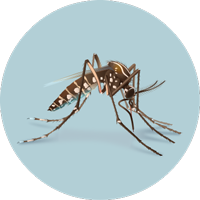ZIKA virus
It surprised me when my wife and I went to donate blood and we were asked about Zika Virus. If you’re like me, you’ve wondered where this new disease came from and how it came to be such a threat now. If mankind can control the Ebola virus, how does the Zika virus seem to get around so easily?
I live in Denver, Colorado. There are many nice things about Denver. It’s sunny most of the time and cool at night for sleeping. We have very low humidity, which makes it bearable when it’s hot. The low humidity also takes a toll on insects. The last time I got bit by a mosquito in Denver was 2009, and that was in an area that was artificially watered.

Zika Virus
Zika is a fairly new virus, first isolated from rhesus monkeys and mosquitos in the 1940s in the Zika forest of Uganda.
The virus appears to have evolved into its current form as a threat to human health. The virus was first identified in humans in Nigeria the 1950s and in the 1960s produced the first cases of Zika with its current symptoms. Epidemics of Zika virus have occurred on islands in the South Pacific Ocean and in South America. Clearly, the virus is spreading by land to North America and by travelers throughout the US. Every US state except Alaska and Wyoming have reported cases of Zika virus. Florida, Texas and California have the highest incidence of Zika.
The Zika virus will be hard to control.
- Zika is spread by several species of mosquitos.
- In addition to humans, Zika virus can infect animals, birds, and reptiles.
- The virus can be spread through sexual contact and through blood transfusion.
- The virus can be detected in blood and other body fluids, but the results are not always reliable, with contradictory results sometimes seen in different fluids.
While we can screen for Zika exposure using the presence of antibodies to the virus, we don’t really know who has the Zika virus based on symptoms. A large percentage of patients who contract Zika virus will have no symptoms.
About four out of five patients with Zika virus will have no clinical symptoms.
In others, Zika is usually a mild disease treated with supportive care. Signs and symptoms of Zika are common; the virus is characterized most commonly by rash, but headache, fever, joint pain and swelling, and conjunctivitis are common though not always present together.
Zika can be serious in certain patients. Some patients will go on to develop Guillain-Barré syndrome, a neurological disease that can be self-limiting, but which can also progress to have serious consequences. Patients contracting Zika virus during pregnancy have an increased risk of seriously adverse fetal outcomes, including pregnancy complications and microcephaly, incomplete brain development. I expect we will learn more about Zika and its complications over the next year.
With an animal reservoir for Zika virus and the large percentage of patients showing no symptoms, it is unlikely that the virus can be easily contained. While we await the development of an effective Zika vaccine, the best approach is to avoid travel to areas in which Zika is prevalent or to take serious steps to minimize your opportunities to feed mosquitos.
Your prescriber or community pharmacist can answer questions about Zika and other health concerns. Their job is to keep you healthy. Talk to them and take good care of yourself.
Resources:
Anderson-KB, Thomas-SJ and Endy-TP:
The Emergence of Zika Virus: A Narrative Review
Ann Intern Med. 2016;165(3):175-183. doi:10.7326/M16-0617
http://annals.org/article.aspx?articleid=2520467
Centers for Disease Control – Zika Virus home page http://www.cdc.gov/zika/index.html











